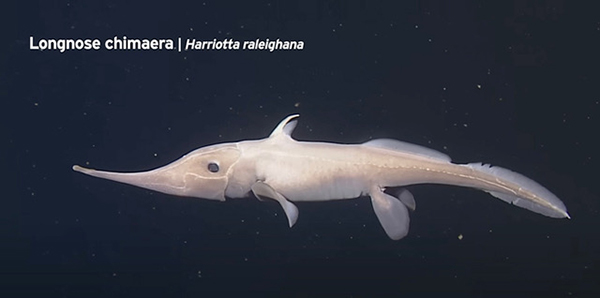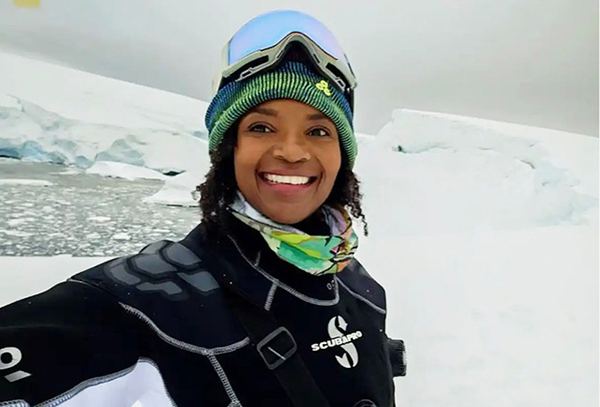Flotsam & JetsamContents of this Issue: Tiger Beach, Grand Bahama Island Tiger Beach Dives Can Go Wrong Chest Compressions Can Save a Diver's Life Emperor Explorer, The Maldive Islands The Risks of Diving in Remote Places The Value of Using a Dive Travel Agent The Shark Whisperer on Netflix Take Clive Cussler on Your Deco Stop Orcas Have Been Trying to Feed People Editorial Office: Ben Davison Publisher and Editor Undercurrent 3020 Bridgeway, Suite 102 Sausalito, CA 94965 from the July, 2025 issue of Undercurrent
Thank for the Kind Words. We do our best to keep the dive industry honest, so it's quite a compliment when a dive industry leader recognizes it. Believe me, it's rare, so we were quite pleased to be acknowledged by Mike Lever, who runs the Nautilus Fleet. "I want to commend you and support you in every way I can on your recent reporting on the fires, sinkings and general lack of safety on liveaboards. Your reporting hopefully opens divers' eyes to the risks of going to sea. I wish a genuine and bona fide, strong safety culture was the cornerstone of every diving operation. Sadly, I don't think that's true. I read in the latest issue of Undercurrent about a dive travel specialist writing you to complain that your reporting is hurting the industry. BAAHHHHHH. I totally disagree. Safety needs to be something we shine a big spotlight on. Please keep up the excellent work." Read the Instructions and Save your Life: One of our wise Irish subscribers, Simon Carolan (Dublin), recently told us, "I was diving in Florida a few years back and a large group from Pennsylvania was on the boat. I was chatting with an instructor from the group when one of his customers came over holding her computer with a bewildered look on her face to ask what the flashing symbol on the display meant (missed safety stop in this case). Three hours on a flight to Miami plus another couple of hours in a coach down to Tavernier for the big dive trip of the year, and she didn't make time to read the little book that came with the new computer she had bought specially for this dive trip." RTFM! Yes, We Are Always Amazed by Those Who Don't RTFM. There are folks who buy a new computer, take it straight out of the box and go diving, without ever reading the manual. Then, when making dives that are a bit easier but deeper than they usually do, unfamiliar displays appear on their computer. It's not at 80 feet that one need to discover what a little up-arrow or down-arrow means. RTFM to know what your dive computer might tell you before you get into deep water.
Into the Deep. If you'd enjoy watching 10 minutes of fascinating deep-sea creatures and marine life you've never seen before, the Monterey Bay Aquarium Research Institute has posted a beautiful video on YouTube. It's full of high-definition footage taken at depths exceeding 1000 feet. Something for dentists' reception areas? You can see it here: youtube.com/watch?v=ryRcPeOM1sY Six Bends Cases a Month in Cozumel. As we reported in our June mid-month email, between November 2019 and November 2023, 289 divers were treated for DCS at the Costamede Cozumel Hospital. Montserrat May Araujo, MD, reported that 211 required treatment in the hyperbaric chamber, while 78, who had modest symptoms, were ambulatory and treated with oxygen and intravenous hydration. Underwater Hyperbaric Medicine Society Prompt Action Saves a Hand. While a 9-year-old girl, Leah Lendel, was snorkeling off Boca Grande, Florida, on June 12, a shark bit her hand and nearly severed it. Later that day, she underwent serious surgery at Tampa General Hospital, and by the next morning, doctors restored movement in two of her fingers; the rest of her hand remained numb. Emergency responders arranged for air transport to Tampa within 10 minutes of arriving at the scene of the accident. Shark Trust's Great Shark Snapshot Week Adds Data. UK-based Shark Trust is always pleased to receive photos and videos (with date and place) from divers and snorkelers to add to its shark and ray database. Coming up, the last week of July, is its Great Shark Snapshot week, and they especially invite underwater photographers to send in shark pictures with details made during that week. It happens to coincide with Discovery Channel's Shark Week as well as the 50th anniversary of the release of the film Jaws. Submitting photos to the Trust is a good way to show the joy, not the fictious horror, of diving with sharks. sharktrust.org/the-great-shark-snapshot Pollution in the Clear Waters of Raja Ampat. Despite mounting public and environmental pressure, the Indonesian government has stopped short of halting all nickel mining operations in Raja Ampat, Southwest Papua. The Indonesian government has revoked four licenses for nickel mining operations, but not the license for the most advanced project on Gag Island. Environmental groups have welcomed the move, but criticized the government for failing to revoke the permit for PT Gag Nikel, noting their pollution of land and water, sedimentation release and deforestation.
Another World Record. Corhonda Dawson, a Memphis (TN) occupational therapist and mother of two, has set a new world record for the fastest time to scuba dive on all seven continents. She started on April 1 in near-freezing waters in Whalers Bay, Antarctica, and finished on April 13 in Los Angeles, visiting Rio de Janeiro, Portugal, Tangier, Dubai, and Sydney along the way. Dawson achieved the feat in just 11 days, 19 hours, and 23 minutes (according to Guinness World Records), surpassing the previous record of 19 days, 19 hours, and 40 minutes set by Barrington Scott in December. That must have set someone back about $40k. It's Become a Circus! People who swim with orcas in Mexico at Baja California Sur are bringing trouble to the orcas, and marine life experts are calling for stricter limits. Of course, local tour operators are resisting. The regulations fall into a legal grey area, allowing operators to exploit loopholes in Mexican law that protect endangered marine wildlife. Occasionally, as many as 40 boats form a cavalcade assisted by spotter planes, which locate the pods to ensure that their clients get their money's worth. Local fishing boats, some without insurance or the proper licenses, are competing with the bigger foreign-owned companies that bring tourists from Cabo San Lucas or La Paz. Marine operators are looking for limits so that tourists can continue swimming with the orcas in a way that is safe for both parties. We'll know it's accomplished when the orcas start offering the patrons dead fish. More Uses for Drones. Notwithstanding the problem with orca safaris, subscriber Joel M. Snyder (Tucson, AZ) reports that drones are being used to find whale sharks in the Sea of Cortez. He wrote, "On our recent trip off Rocio del Mar, one of the dive guides brought his drone out and found whale sharks so fast that the boats couldn't keep up with him. Watching them on the screen was incredible -- from a consumer-class drone; they stand out like school buses in a field of wheat. Finding the sharks so quickly saved time and fuel for the local operators and made the whole experience better for the divers." Looks like those Mexican pilots chasing orcas will soon be out of business. A Dive With Bite. Subscriber Mary Wiksten (Bryan, TX) writes, "While most fish bites occur in the ocean, they may even occur in a quarry! Flashy jewelry, such as a medal on a chain, can act like a fish lure. One of my fellow divers found out the hard way that bluegills (yes, those common little sunfish that live everywhere) can be attracted to shiny earrings -- CHOMP -- and it drew a little blood! You'll get sympathy if bitten by a shark or barracuda but not a bluegill." Fewer Lionfish in Florida's East Coast. While their population growth seems unstoppable elsewhere, lionfish hunter Jonah Kawali reports that they are finding fewer lionfish south of Jupiter in Florida this year. He writes, "There's actual evidence of lionfish being preyed upon by snapper, grouper, sharks, and other species, which is a promising development. Those of us who hunt lionfish know that the numbers are definitely down. To find bigger populations, we're having to go farther north, where there are fewer divers and reefs. With lower-than-normal temperatures along the Florida east coast and extreme thermoclines, the decline in lionfish population and water temperature has been quite significant, making for some odd times, especially considering 90°F water temperatures [farther south] in the Keys." |

I want to get all the stories! Tell me how I can become an Undercurrent Online Member and get online access to all the articles of Undercurrent as well as thousands of first hand reports on dive operations world-wide
| Home | Online Members Area | My Account |
Login
|
Join
|
| Travel Index |
Dive Resort & Liveaboard Reviews
|
Featured Reports
|
Recent
Issues
|
Back Issues
|
|
Dive Gear
Index
|
Health/Safety Index
|
Environment & Misc.
Index
|
Seasonal Planner
|
Blogs
|
Free Articles
|
Book Picks
|
News
|
|
Special Offers
|
RSS
|
FAQ
|
About Us
|
Contact Us
|
Links
|
3020 Bridgeway, Ste 102, Sausalito, Ca 94965
All rights reserved.



